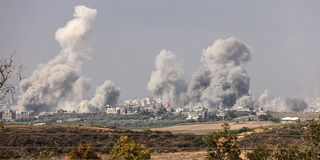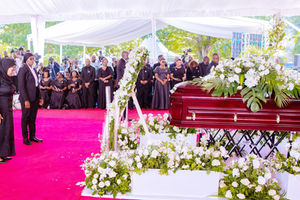Israel pounds Gaza as Red Cross warns of 'intolerable' suffering

Smoke billows above the northern Gaza Strip following an Israeli strike, in an image taken from the southern Israeli city of Sderot on October 23, 2023. PHOTO | AFP
What you need to know:
- Israel unleashed a massive bombing campaign after Hamas gunmen stormed across the Gaza border on October 7, killing 1,400 people.
- Since then, relentless Israeli strikes on Gaza have killed more than 8,000 people, half of them children, according to the health ministry in the territory.
Israel further intensified its attacks on Gaza Sunday, warning its war on Hamas would be "long and difficult", as calls mounted to end the violence and the Red Cross warned of "intolerable" suffering.
The United Nations said thousands more civilians could die in Gaza as Israel announced the war had entered a "second stage", with ground forces still operating inside the Hamas-run territory more than 24 hours after entering it on Friday.
Israel unleashed a massive bombing campaign after Hamas gunmen stormed across the Gaza border on October 7, killing 1,400 people, mostly civilians, and seizing 230 hostages, according to Israeli officials.
Since then, relentless Israeli strikes on Gaza have killed more than 8,000 people, half of them children, the Hamas-controlled health ministry in the territory said Saturday.
Communications were meanwhile gradually being restored in Gaza on Sunday after a more than 24-hour blackout. Thousands of buildings have been flattened in the overcrowded territory of 2.4 million people, with more than half the population displaced as Israel imposed a near-total siege.
Mirjana Spoljaric, president of the International Committee of the Red Cross, voiced shock Saturday at the "intolerable level of human suffering", urging all sides to de-escalate the conflict.
"This is a catastrophic failing that the world must not tolerate."
But despite increasingly frantic appeals for an end to the violence, Israel says it is intensifying its ground operations, while continuing to pummel Gaza from the sky.
Hamas authorities reported Sunday a "large number" of people killed overnight in strikes on two refugee camps in northern Gaza.
Israel's Home Front Command earlier warned residents in the southern cities of Ashdod and Ashkelon of incoming missile and rocket attacks.
The intense strikes against Hamas, which has ruled Gaza since 2007, provided cover for Israeli ground forces to step up operations, ahead of an expected full-blown invasion.
"Since early Friday evening, combined combat forces of armour, combat engineers and infantry have been operating on the ground in the northern Gaza Strip," the Israeli army said late Saturday.
"This is the second stage of the war whose goals are clear: destroying the military and leadership capabilities of Hamas, and bringing the hostages back home," Netanyahu told journalists.
He vowed to "eradicate" Hamas "for the sake of our existence".
"The war in the (Gaza) Strip will be long and difficult and we are prepared for it."
Defence Minister Yoav Gallant said earlier that Israel was attacking "above the ground and below the ground" in the new phase of the war, alluding to the sprawling network of tunnels Hamas has built under Gaza.
Israeli fighter jets meanwhile dropped leaflets over Gaza City warning residents that the area was now a "battlefield", that shelters in northern Gaza were not safe, and they should "evacuate immediately" to the south.
The army delivered similar warnings earlier in its campaign, but many who fled south have returned home after failing to find refuge from Israeli bombing.
UN human rights chief Volker Turk has warned of "the possibly catastrophic consequences of large-scale ground operations in Gaza", saying "thousands more civilians" could die.
And as Israel sends troops and tanks further into Gaza, analysts cautioned of possible fallout threatening the entire Middle East, even as Western fears grow that Iran-backed Hezbollah could open a new front on the Lebanese border.
A UN peacekeeper was injured Saturday by shelling in south Lebanon, the mission's spokesman said, hours after reporting a hit at its headquarters as Israel-Lebanon border skirmishes intensify.
Hamas's armed wing said it was ready to release the hostages it abducted if Israel freed all the Palestinian prisoners it was holding.
"The price to pay for the large number of enemy hostages in our hands is to empty the (Israeli) prisons of all Palestinian prisoners," Ezzedine al-Qassam Brigades spokesman Abu Obeida said.
Hamas's leader in Gaza, Yahya Sinwar, said the group stood ready to make an "immediate" exchange.
This week, the Brigades said "almost 50" of the hostages had been killed in Israeli strikes.
Facing increasing anger over the fate of the captives as Israel steps up its war on Hamas, Netanyahu met representatives of hostage relatives on Saturday.
Ifat Kalderon, whose cousin Ofer Kalderon is believed to be held in Gaza along with members of his family, told AFP she supported the idea of a prisoner release in exchange for the hostages.
"Take them, we don't need them here. I want my family and all the hostages to come back home," she said.
Netanyahu made no commitment to any exchange deal but assured hostage families Israel would "exhaust every option to bring them home."
All communications and phone networks were cut across Gaza late Friday, sparking alarm as the Palestinian Red Crescent warned emergency calls were not getting through.
Human Rights Watch also cautioned the blackout could provide "cover for mass atrocities".
But on Sunday morning, global network monitor Netblocks said connectivity in Gaza was being restored, and Palestinian telecoms provider Jawwal said communication services were gradually resuming.
An AFP staff member in Gaza City confirmed early Sunday that he could use the internet and telephone network, and said he had managed to contact people by phone in southern Gaza.
During the outage, billionaire Elon Musk said his Starlink satellite service would support internet access for "internationally recognised aid organisations in Gaza"
Starlink is a network of satellites in low Earth orbit that can provide internet to remote locations, or areas where normal communications infrastructure has been disabled.
EU foreign policy chief Josep Borrell has demanded a "pause of hostilities" to allow aid into Gaza, while the UN General Assembly has called for an "immediate humanitarian truce".
Addressing several hundred thousand pro-Palestinian demonstrators in Istanbul on Saturday, Turkish President Recep Tayyip Erdogan said "the main culprit behind the massacre unfolding in Gaza is the West".
His comments prompted Israel to recall all of its diplomats from Turkey.
Israel's military campaign has displaced more than 1.4 million people inside Gaza, according to the UN, while supplies of food, water and power to the crowded territory have all but halted and fuel deliveries have been completely cut off.
A first convoy of aid was allowed in on October 21, but only 84 trucks have crossed in since then, according to the UN, which says 500 trucks on average entered Gaza each day before the conflict.
Violence has also risen sharply in the occupied West Bank since the October 7 attacks, with 109 Palestinians killed by Israeli forces or settlers, including 33 children, according to the UN.





